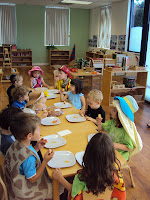It is a delight to watch the children's joy at play and discovery.
 |
| "It's a sukkah!" "When did that get built?!" |
As a way to continue and expand upon our conversation about the sweet, helpful things we can do for others, we have brought "puppets" into our classroom to help us explore some very important social skills.
Puppets give the children the opportunity to be "objective observers" which allow the children to take in the whole picture (both sides of the story), and more honestly assess right from wrong.
Caterpilla knocked over Foxina's tower of blocks.
Dena/Foxina: Why did you knock down my blocks?
Aaron/Wolfred: I tripped.
(Morah Katie: What can happen next? What can Foxina say to Wolfred? What Can Wolfred say to Foxina?Voices from audience: Say sorry/Help/ Don't trip
Morah Katie: These are good suggestions, I wonder what will happen?)
Aaron/Wolfred: I'm sorry.
Dena/Foxina: Will you help me build it?
Aaron/Wolfred: Yes I can help you.
Josiah and Noam act out Scenario 2:
Foxina tries to play with Wolfred, but instead of asking to play she knocks down the blocks.
Josiah/Wolfred: Foxina please dont' knock down my blocks.
Noam/Foxina: I want to play.
Josiah/Wolfred: I don't want to play with you if you knock down my blocks. Will you ask me and not knock them over?
Noam/Foxina: I play with you?
Josiah/Wolfred: Yes let's build.
We played out these scenarios over the week, varying the situation, and asking for all the possible outcomes.
Thursday during outside play I had the good fortune of witnessing the following:
After playing tag...
Josiah: I don't want to be IT any more.
Noah: I don't want to be IT.
Kian: I will be IT.
(running and tagging and running and tagging...... the boys become tired and have some frustrations....)
Kian: I am done being IT, you be IT.
Josiah: Well I don't want to be IT. You be IT.
Noah: No I don't want to be IT.
Kian: Ok I'll be IT but Noah is on my team.
Josiah: Wait, who will be on my team?
Noah: I'll be on your team.
Kian: But you are on my team.
Josiah: I won't have a team unless I find someone else to play and no one wants to play tag.
Noah; Well I don't want to be IT.
Kian: I don't either and we don't have enough for teams, I am going to do something else.
Josiah: Can I play something else with you? We won't need teams.
Kian: You can do this with me (filling a bottle with pebbles)
Josiah: Ok, let's do that.
Noah: I want to play, can I play?
Josiah: Yes.
Kian: Yeah, we need pipes.
The boys expressed what they did not want, talked to each other and came to a solution they were all happy with.
Another fun thing that helped the children begin thinking of the kind things they can do for others was to find the "missing half a heart" and complete the heart.
Morah Katie: What does it mean when we draw a heart?
Dena: Love
Morah Katie: What does it feel like when someones shows you they care about you by doing something kind and helpful for you?
Noah: I feel good.
We hid one set of half hearts around the room, when the children found the missing pair we discovered what message of kindness the heart stated, for example:
It has been a wonderful month, we accomplished so much and it is simply the end of September!
Dena: Love
Morah Katie: What does it feel like when someones shows you they care about you by doing something kind and helpful for you?
Noah: I feel good.
We hid one set of half hearts around the room, when the children found the missing pair we discovered what message of kindness the heart stated, for example:




 what is hidden in the rice? SHAPES!!
what is hidden in the rice? SHAPES!!
 Sometimes it's nice just to sit and take it all in.
Sometimes it's nice just to sit and take it all in.














































